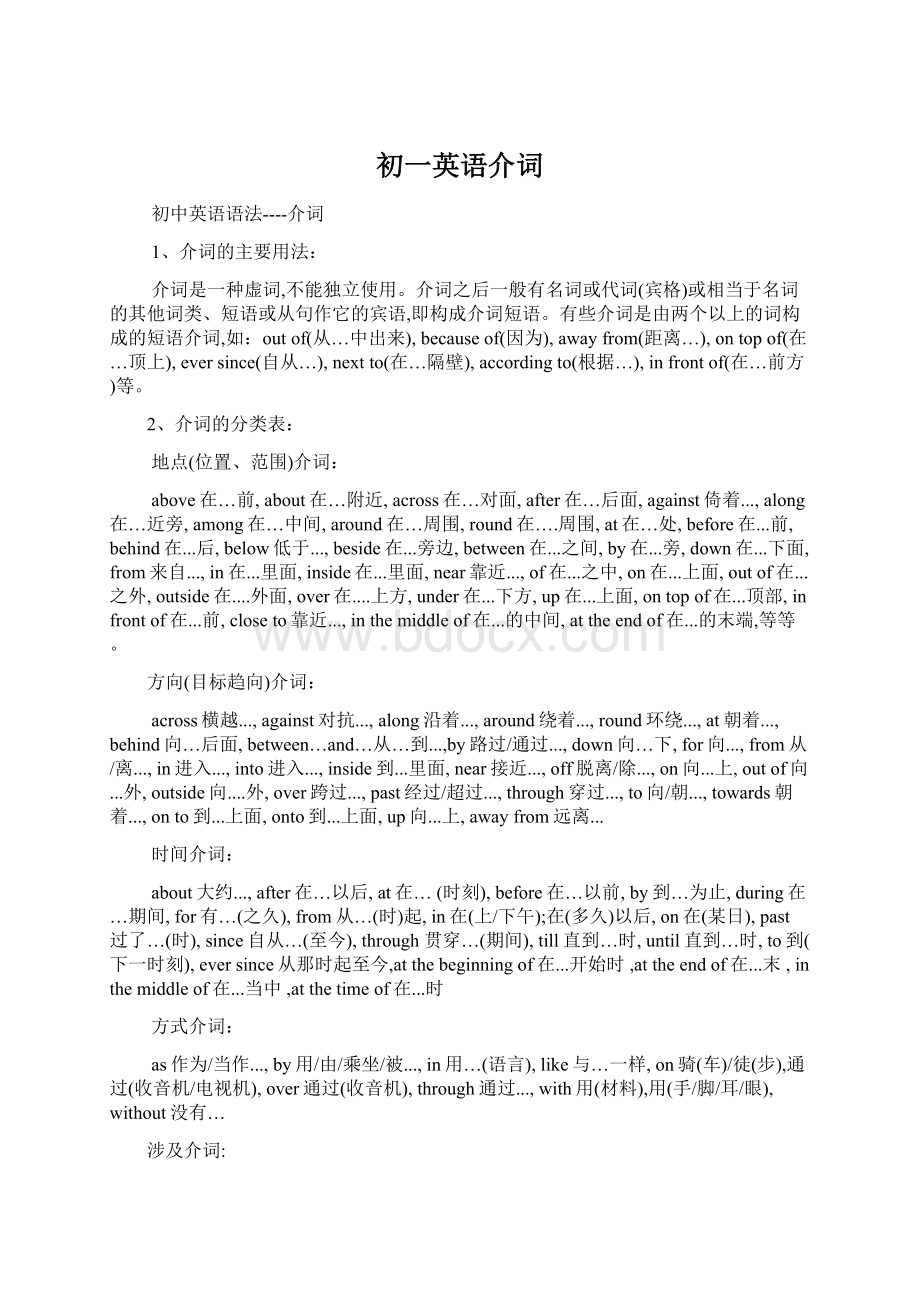初一英语介词.docx
《初一英语介词.docx》由会员分享,可在线阅读,更多相关《初一英语介词.docx(13页珍藏版)》请在冰豆网上搜索。

初一英语介词
初中英语语法----介词
1、介词的主要用法:
介词是一种虚词,不能独立使用。
介词之后一般有名词或代词(宾格)或相当于名词的其他词类、短语或从句作它的宾语,即构成介词短语。
有些介词是由两个以上的词构成的短语介词,如:
outof(从…中出来),becauseof(因为),awayfrom(距离…),ontopof(在…顶上),eversince(自从…),nextto(在…隔壁),accordingto(根据…),infrontof(在…前方)等。
2、介词的分类表:
地点(位置、范围)介词:
above在…前,about在…附近,across在…对面,after在…后面,against倚着...,along在…近旁,among在…中间,around在…周围,round在….周围,at在…处,before在...前,behind在...后,below低于...,beside在...旁边,between在...之间,by在...旁,down在...下面,from来自...,in在...里面,inside在...里面,near靠近...,of在...之中,on在...上面,outof在...之外,outside在....外面,over在....上方,under在...下方,up在...上面,ontopof在...顶部,infrontof在...前,closeto靠近...,inthemiddleof在...的中间,attheendof在...的末端,等等。
方向(目标趋向)介词:
across横越...,against对抗...,along沿着...,around绕着...,round环绕...,at朝着...,behind向…后面,between…and…从…到...,by路过/通过...,down向…下,for向...,from从/离...,in进入...,into进入...,inside到...里面,near接近...,off脱离/除...,on向...上,outof向...外,outside向....外,over跨过...,past经过/超过...,through穿过...,to向/朝...,towards朝着...,onto到...上面,onto到...上面,up向...上,awayfrom远离...
时间介词:
about大约...,after在…以后,at在…(时刻),before在…以前,by到…为止,during在…期间,for有…(之久),from从…(时)起,in在(上/下午);在(多久)以后,on在(某日),past过了…(时),since自从…(至今),through贯穿…(期间),till直到…时,until直到…时,to到(下一时刻),eversince从那时起至今,atthebeginningof在...开始时,attheendof在...末,inthemiddleof在...当中,atthetimeof在...时
方式介词:
as作为/当作...,by用/由/乘坐/被...,in用…(语言),like与…一样,on骑(车)/徒(步),通过(收音机/电视机),over通过(收音机),through通过...,with用(材料),用(手/脚/耳/眼),without没有…
涉及介词:
about关于...,except除了…,besides除了…还...for对于/就…而言,in在…(方面),of…的,有关...,on关于/有关...,to对…而言,towards针对...,with就…而言
其它介词:
【目的介词】for为了...,from防止…,to为了…
【原因介词】for因为...,with由于…,becauseof因为...
【比较介词】as与…一样,like象…一样,than比...,to与…相比,unlike与…不同
【伴随/状态介词】against和…一起(比赛),at在(上班/休息/上学/家,etc.),in穿着…(衣服/颜色),into变成...,on在(值日),with与…一起,有/带着/长着...,without没有/无/不与…一起
3、重要注释:
⑴this/that/these/those/last/next/a/every/each等词构成的时间短语,前面不用任何介词。
如:
EveryyeartravelersfromabroadcometovisitPingyao.(每年都有国外的游客来游览平窑镇)/Hehadabadcoldthatweek.(那个星期他患重感冒)
⑵for有时用来引出动词不定式的逻辑主语,常翻译成“对于…而言”。
如:
It’stoohardformetofinishtheworkinonlyonehour.(让我在区区一个小时内完成这项工作太难了)/Thehouseisbigenoughfor10mentolivein.(房子够大的可以容10个人住)
⑶of有时用来表示后面的人物正好是前面的表语的逻辑主语。
如:
It’sverynice/kindofyoutodoso.(你这么做真是太好了)
⑷介词有时会与它的宾语分离,而且宾语前置。
当宾语是疑问词时。
Whoareyoutalkingabout?
(你们在谈论谁?
)
宾语在从句中当连接词时。
Hehasayoungerbrotherwhohemusttakegoodcareof.(他有一个需要他照顾的小弟。
)/Doyouknowwhoourteacheristalkingwithoverthere?
(你知道我们的老师在那边和什么人谈话吗?
)
动词不定式作定语且该动词为不及物动词,后面有介词。
Ifinallyfoundachairtositon.(我最终找到了一张椅子坐。
)
[5]记住一些固定词组:
arriveat/in(到达…),onfoot(步行),not…atall(根本不),tothenorthof(在…以北),intheeastof(在…的东部),inthenight(在夜间),atnight(在晚上),beafraidof(害怕…),befullof(充满/装满….),befilledwith(充满/装满….),begood/badfor(对…有益/有害),bemadeof(由…做成),bemadefrom(由…制造),playwith(玩耍……),lookoutof(朝…外面看),attheendof(在…末梢/结束时),bytheendof(不迟于…/到…末为止),withthehelpof或withone’shelp(在…的帮助下),lookafter(照料…),lookfor(寻找…),onabike(=bybike)骑车,helpsb.with(帮某人做…),geton(well)with(与某人相处[融洽]),等等。
4、某些介词的用法辨析:
⑴时间或地点介词in、on、at的用法区别:
表示时间时,in表示在一段时间里(在将来时句子中则表示在一段时间之后),on表示在具体的某一天或者某天的上下午等,at表示在某个时刻或者瞬间;表示地点时,in表示在某个范围之内,on表示在某个平面上或与一个面相接触,at则表示在某个具体的场所或地点。
如:
HewasbornonthemorningofMay10th.(他出生于五月十日的早晨)/Iusuallygetupat7:
00inthemorning.(我通常在早上的七点钟起床)/Hisglassesarerightonhisnose.(他的眼镜就架在他的鼻子上)/Heisatthecinemaatthemoment.(此刻他正在电影院)
⑵after与in表示时间的用法区别:
“after+(具体时刻/从句)”表示“在…时刻之后”常用于一般时态;“in+(一段时间)”表示“在(多久)之后”,常用于将来时态。
如:
Hesaidthathewouldbehereafter6:
00.(他说他六点钟之后会来这儿)/MyfatheriscomingbackfromEnglandinaboutamonth.(我父亲大约一个月以后从英国回来)
⑶since与for表示时间的用法区别:
“since+(具体时刻/that-从句)”表示“自从…起一直到现在”,“for+(一段时间)”表示“总共有…之久”,都常用于完成时态;如:
UncleLihasworkedinthisfactorysince1970.(李叔叔自从1970年起就在这家工厂工作了)/UncleLihasworkedinthisfactoryforover30years.(李叔叔在这家工厂已经工作了30多年)
⑷by、in与with表示方式的用法区别:
都可以表示“工具、手段”,但是by主要表示“乘坐”某个交通工具或“以……方式”,在被动句中可以表示动作的执行者;in表示“使用”某种语言/文字,with表示“使用”某个具体的工具、手段。
如:
Weseewithoureyesandwalkwithourfeet.(我们用眼睛看东西,用双脚走路)/Pleasewritethatarticle(文章)inEnglish.(请你用英语写那篇文章)/Let’sgotothezoobytaxi.(我们打的去动物园吧。
)/ItwaswrittenbyLaoShe.(那是老舍写的)
⑸about与on的用法区别:
都可以表示“有关…”,但是about的意义比较广,而on主要表示“有关…(专题/课程)”。
如:
TomisgoingtogiveatalkonthehistoryofAmerica.(汤姆要作一个美国历史的报告)/Theyareveryexcitedtalkingaboutthecomingfieldtrip.(他们兴致勃勃地谈论着即将来到的野外旅游)
⑹through与across、over的用法区别:
through指“穿过…(门洞/人群/树林)”;across和over可以指“跨越…(街道/河流)”,可互换,但是表示“翻过…”时只能用over.如:
Justthenarat(鼠)ranacrosstheroad.(就在那时一只老鼠跑过路面)/Thereisabridgeacross/overtheriver.(河上有座桥)/Theyclimbedoverthemountainandarrivedthereaheadoftime.(他们翻过大山提前到达了那里)/Thevisitorswentthroughabiggateintoanotherpark.(参观者们穿过一个大门来到另一个公园)
[7]as与like的区别:
两个词都表示“像……”,但是as译为“作为……”,表示的是职业、职务、作用等事实,而like译为“像……一样”,表示外表,不是事实。
如:
Letmespeaktoyouasafather.(我以父亲的身份和你讲话。
)(说话者是听者的父亲)/Letmespeaktoyoulikeafather.(让我像一位父亲一样和你讲话)(说话者不是听者的父亲)
[8]attheendof、bytheendof、totheend、intheend的用法区别:
attheendof…既可以表示时间也可以表示地点,译为“在…末;在…尽头”,常与过去时连用;bytheendof…只能表示时间,译为“在…前;到…为止”,常用于过去完成时;intheend与atlast基本等义,表示“终于、最后”,通常用于过去时;totheend译为“到…的终点为止”,前面往往有表示运动或连续性的动词。
如:
Bytheendoflasttermwehadlearned16unitsofBookIII.(到上学期期末我们已经学习了第三册16个单元)/Attheendoftheroadyoucanfindabigwhitehousewithbrownwindows.(在路的尽头你能找到一幢有棕色窗户的白房子)/TheyleftforBeijingattheendoflastweek.(上周末他们动身去了北京)/Intheendhesucceededinthefinalexams.(他最终在期末考试中考及格了)/Weshouldgoonwiththeworktotheend.(我们应该把工作干到底)/Followthisroadtotheendandyouwillseeapostoffice.(沿这条路走到底就能看见一家邮电局)
[9]foramoment、forthemoment、inamoment、atthemoment的区别:
foramoment“一会儿、片刻”(=forawhile),常与持续性动词连用;forthemoment“暂时、目前”,常用于现在时;inamoment“一会儿、立即、马上”(=soon;inafewminutes),一般用于将来时;atthemoment“此刻,眼下”(=now),用于现在进行时。
如:
Pleasewaitforamoment.(请稍等)/Let’sleavethingsastheyareforthemoment.(暂时就维持现状吧!
)/I’llcomebackinamoment.(我过会儿回来)/Iamverybusyatthemoment.(眼下我很忙)
[10]but的问题:
用介词but引出另一个动词时,要注意:
如果前面有do,后面就用原形动词,前面没有do时,后面的动词要加to。
如:
Icoulddonothingbutwait.(我什么也做不了只能等)/Theyhadnochoice(选择)buttofight.(他们没有选择只有战斗)
[11]infrontof与inthefrontof:
infrontof“在…的前面”,与inthefrontof“在…的前部”。
如:
Acarwasparkinginfrontofthehall.(大厅跟前停着一辆汽车)/Inthefrontofthehallstoodabigdesk.(大厅前部立着一个大讲台)[12]except与besides的区别:
except“除了”,表示排除掉某人物,即不包含;而besides“除了”则表示包含,即“不仅……又……”。
如:
EveryonewenttothePalaceMuseumexceptTom.(除了Tom,大家都去了故宫博物院)(Tom没有去故宫)/BesidesChinesehealsostudiedmanyothersubjects.(除了汉语之外,他还学其他许多功课)(“汉语”也是他学的功课之一)
初中英语时态语态练习100题
1.Thesun________intheeast.
A.isalwaysrising B.alwaysisrising C.risesalways D.alwaysrises
2.Heoften________hisclothesonSundays.
A.washing B.washes C.haswashed D.wash
3.I’mJapanese.Where________from?
A.doyoucome B.youarecoming C.youcome D.areyoucoming
4.Amotherwho________hersonwilldoeverythingforhishappiness.
A.isloving B.loves C.loved D.hasloved
5.________atahighertemperaturethanwater?
A.Hasmilkboiled B.Ismilkboiling C.Doesmilkboil D.Wasmilkboiling
6.Hesignedtouswithhishand,“Thelessonisover.You________.”
A.dismissed B.aredismissed C.havedismissed D.weredismissed
7.Ihaven’tmethimforages,buthismother________himsometimes.
A.hadstillseen B.stillsees C.hasstillseen D.stillsaw
8.Wewillstartassoonasourteamleader________.
A.comes B.willcome C.come D.iscoming
9.IthinkJack________theanswer.
A.hasknown B.doesknow C.isknowing D.knows
10.Myfather________Georgequitewell;theywereintroducedataparty.
A.isknowing B.wasknowing C.knows D.hadbeenknowing
11.Where________?
A.Maryworks B.worksMary C.doesMaryworks D.doesMarywork
12.Ithinkthisquestion________toanswer.
A.easy B.iseasy C.waseasy D.BothAandB
13.________oilorbutterwhenyoucookit?
A.Doyouuse B.Didyouuse C.Wereyouusing D.Haveyouused
14.I________somenewspaperatsevenyesterdayevening.
A.amreading B.read C.wasreading D.willread
15.Nowhe________abookaboutNewYork.Idon’tthinkhewillfinishit.
A.writes B.wrote C.haswritten D.iswriting
16.ZhangHuadoesalotofhouseworkeveryevening,butnowhe________hisschoolmateswiththeirlessons.
A.help B.ishelping C.helps D.hashelped
17.Motherwashesthegirl’shair.Look,she________.
A.iswashingitnow B.washesit
C.iswashingthemnow D.washesthemnow
18.Heusuallylistenstotheradio,butatthepresentmomenthe________television.
A.watches B.iswatching C.haswatched D.hadwatched
19.Howlongago________playingwithsoldiers?
A.haveyoustopped B.hadyoustopped C.didyoustop D.doyoustop
20.LookatJohn!
What________?
A.doeshe B.heisdoing C.ishedoing D.doeshedo
21.It________hardwhenIleftmyhouse.
A.israining B.rains C.wasraining D.willrain
22.Therailway________inthreeyears.
A.iscomplete B.willcompleted C.hascompleted D.willbecompleted
23.Don’ttalksoloudly.Yourfather________.
A.sleeps B.issleeping C.slept D.hadslept
24.-----Whatareyoudoingunderthetable?
-----I________tofindmypen.
A.tried B.hadtried C.try D.amtrying
25.JaneandTom________thedoor.
A.arewalkingat B.walkat C.walksto D.arewalkingto
26.Howmanypeople